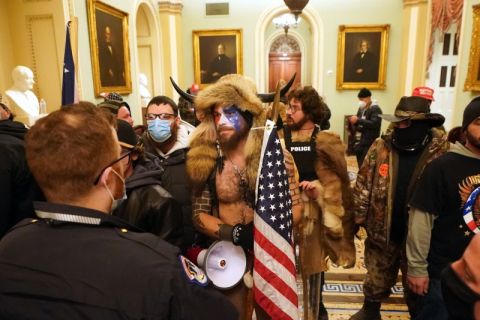

The United States Capitol building is known as “the most recognized symbol of democratic government in the world." But that wasn’t the case on January 6, when hundreds of pro-Trump supporters rioted the building as Congress began to certify the November 3 election results that would officially validate Joe Biden as the next U.S. president.
Professor Ashwini Vasanthakumar, Queen’s National Scholar in Legal and Political Philosophy, shares her critical examination of protests, democracy, and shared deliberative norms, set out below.
Yesterday’s events raise a number of questions of constitutional and criminal law. They also raise more profound questions about democracy and the state of democratic institutions and culture in America and farther afield.
Protest and Democracy
Protests are sometimes seen as a failure or disruption of democratic deliberation, but they play a crucial and ameliorative role in democratic dialogue. In addition to being a constitutionally protected individual right, protest is an important mode of political communication and expression, especially for those individuals and issues that get side-lined or marginalized in ordinary political processes. Our democracies are better because of protest.
In assessing when protests are playing this role, both the methods that protestors use and the ends they seek matter. Many of the civil disobedients we admire are those who sought to realize democratic values and correct problems in the democratic process.
Referring to the Trump supporters storming the legislative house as “protestors” is therefore inaccurate and misleading. By their own admission, their aims were to usurp the democratic process and to deny the authority of the government. Many of these supporters openly referred to a “revolution.”
Trump supporters’ sense of grievance, much advertised and mulled over, is belied by the very gentle policing they received. It is inconceivable that Black protestors behaving in this way would have reached the Capitol building, breached it, and then been “ushered” out. We know that unarmed and peaceful Black Lives Matter protestors were met with police violence, not police selfies. We know that women who protested the confirmation hearings of now-Justice Brett Kavanaugh were arrested. Black protestors are chastised for expressing anger, incivility, any damage to property; White pro-Trump protestors were indulged with sympathetic support from the President even as they vandalized the Capitol building.
There is a deeper problem with how right-wing violence, typically carried out by White men, is seen as “blowing off steam” or the result of mental illness; Black and Brown men and women, on the other hand, are regarded as inherently dangerous, with police violence against them rarely punished. For long, Trump supporters and their apologists have blamed others for not taking them seriously, but on January 6, it was precisely not being taken seriously that kept them alive.
Democracy and Shared Deliberative Space/Norms
There are many ways in which these events signal serious challenges to democratic institutions and norms, and impart some lessons as we look to a Biden administration. These are not restricted to the United States. Right wing extremists have been storming parliaments around the world – Germany, Netherlands, Hungary – in recent years and faced relatively little pushback.
One lesson is a lesson against complacency. We should be vigilant when mainstream politicians are willing to court the far-right instead of dismissing them as silly or crazy. Irrespective of their personal views, this will be a constituency these politicians become beholden to. In Canada, I think there is the complacency of thinking we’re nothing like the U.S. Indigenous and Black people in Canada would disagree. The founder of the Proud Boys is, after all, Canadian.
Another lesson is about the importance of ongoing deliberation and dialogue, including dialogue that is fraught and uncivil. We often worry about polarization, and how to reason, respect and deliberate together as citizens when we have such divergent values and commitments. This has long been cast as a problem of diversity. But I think the emerging problem will be the spread of conspiracist thinking, such as QAnon, on the internet and social media. The absence of a shared sense of reality, of common epistemic standards, and some minimal level of trust erodes the possibilities of deliberation and dialogue in a way that goes beyond polarization.